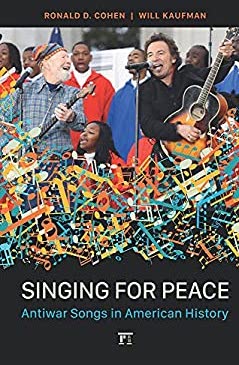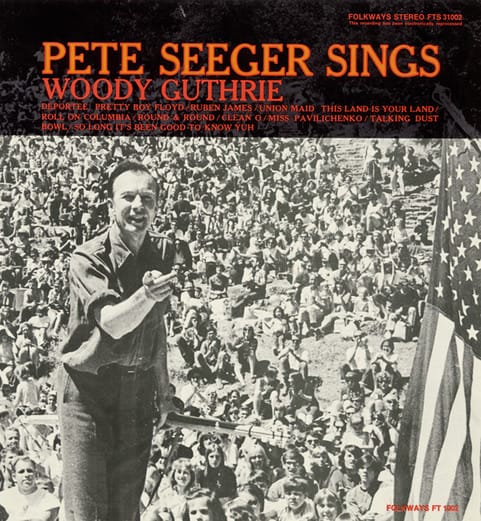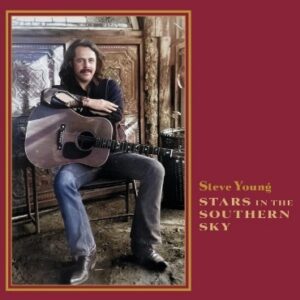My Rainbow Quest: The Life of Ronald D. Cohen
Part 3
Managing Editor’s Note: This third, and final installment of Ron Cohen’s remarkable career shows his political bent in connection to Folk Music. Pete Seeger is truly iconic in American culture. Alan Lomax and The Weavers aren’t far behind. Folklorist Archie Green was a major force on the Folklore scholarship scene. Broadside Magazine and Smithsonian Folkway Records also have great significance.
Clearly, Ron Cohen has been important writing about the Folk Revival which is closely connected to Country Music.
I became increasingly aware of folk music’s leftwing political past. After all, I had grown up on Pete Seeger, Woody Guthrie, and their musical cohorts going back to the 1930s. Pete’s Talking Union album was one of my favorites. I began discussing with my friend Dave Samuelson compiling a CD set focusing on the Almanac Singers and their influences into the 1950s. We first thought that we would have enough original recordings for 4 CDs as well as substantial liner notes.
Dave and I began to reach out for additional recordings, including unissued 78s that I found in Pete Seeger’s house. We also collected photographs, illustrations, and a great deal of background information on the performers, record companies, and their historical contexts.
We wound up with 10 CDs, about 300 songs, and a 212 page hardbound book. Dave and I included background notes and the words to all of the songs. Songs For Political Action: Folk Music, Topical Songs, and the American Left, 1926-1953 was published in 1996. It is still attracting fans such as the folk/rock performer Country Joe McDonald. I also added a bit of text to Dave’s boxed set for Bear Family, Goodnight Irene: The Weavers, 1949-1953.
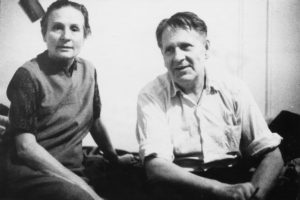
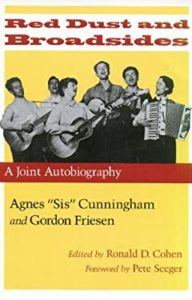
My folk music obsession rapidly gathered steam. I met Sis Cunningham in August 1992 and would visit her on my numerous trips to New York City. Sis had written an autobiography with her late husband Gordon Friesen but couldn’t find a publisher. Sis gave me a copy of the manuscript. I edited Red Dust and Broadsides: A Joint Autobiography including my detailed Afterword. It is one of my cherished accomplishments.
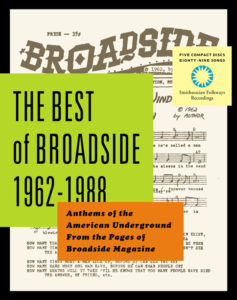
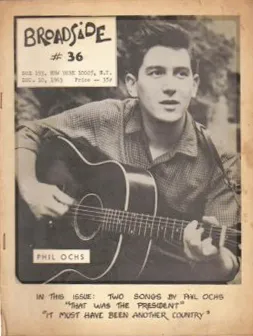
Sis and her husband Gordon launched Broadside magazine in 1962 out of their public housing apartment on New York’s Upper West Side. Encouraged by Pete Seeger each issue of Broadside included a range of topical songs, with Malvina Reynolds and Phil Ochs being the most prolific. Bob Dylan headed the first issue. Jeff Place of the Smithsonian Folkways Recordings office in Washington D.C. suggested compiling The Best of Broadside, 1962-1988: Anthems of the American Underground From the pages of Broadside Magazine.
In 2000, it became a 5 CD set with full notes and illustrations. One day Jeff called to announce that we were nominated for a Grammy. We were one of five finalists in the 2001 historic reissue category. I flew to Los Angeles, California for the 43rd annual award ceremony and attended the various events. Jeff and I did not win, but the experience was reward enough.
Meanwhile, Ralph Lee Smith was carrying on his Scarecrow Press “American Folk Music and Musicians” book series with his Appalachian Dulcimer Traditions book. We published Eric Gordpn’s Ballad of an American: The Autobiography of Earl Robinson. I worked with JoAnne Reuss to edit her late husband’s influential PhD dissertation American Folk Music and Left-Wing Politics, 1927-1957. Ralph secured Paul Gifford’s The Hammer Dulcimer: A History in 2001. Ralph then turned over editing duties to me which I happily carried on for another decade.
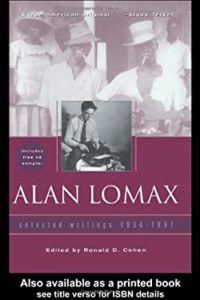 I had long been interested, and impressed, by Alan Lomax. He had not only been an influential folklorist, but also heavily involved with domestic folk music circles since the 1930s. I examined his archives in New York City and decided to round up a group of scholars for a book covering much of his astounding life. Alan Lomax: Selected Writings, 1934-1997 appeared in 2003. There were five sections with thirty-four selections drawn from Lomax’s published shorter writings.
I had long been interested, and impressed, by Alan Lomax. He had not only been an influential folklorist, but also heavily involved with domestic folk music circles since the 1930s. I examined his archives in New York City and decided to round up a group of scholars for a book covering much of his astounding life. Alan Lomax: Selected Writings, 1934-1997 appeared in 2003. There were five sections with thirty-four selections drawn from Lomax’s published shorter writings.
My interest in the history of the radical left led me to meet Harvey Matusow. He had been active in the Communist Party following World War II but he became an FBI informer and testified against Pete Seeger and the Weavers before the House Unamerican Affairs Committee. I co-authored Deadly Farce: Harvey Matusow and the Informer System in the McCarthy Era published in 2004.
I retired in 2004. I discovered I liked to help others with their books, both editing and publishing. There could never be enough academic books on folk music. Scarecrow Press happily agreed. Along with my friend Ed Kahn, we took over the series in 2001 with the publication of Fred Metting’s The Unbroken Circle: Tradition and Innovation in the Music of Ry Cooder and Taj Mahal. The same year we issued Todd Harvey, The Formative Dylan: Transmission and Stylistic Influences, 1961-1963. Todd’s book was an important addition to the mounting Dylan literature.
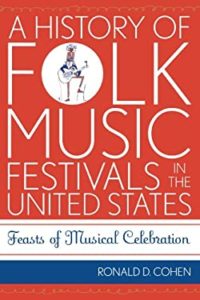
Next up was Nolan Porterfield’s editing of Exploring Roots Music: Twenty Years of the JEMF Quarterly (2004). Ed Kahn had been one of the founders of the John Edward’s Memorial Foundation at UCLA and was instrumental in founding the JEMF Quarterly. I was lucky to get Nolan as the editor, who had published noted biographies of Jimmie Rodgers and John Lomax. Nolan selected important articles from the quarterly’s history. In 2008, the Scarecrow Press series included Bob Coltman’s fascinating Paul Clayton and the Folksong Revival and my own A History of Folk Music Festivals in the United States: Feasts of Musical Celebration.
My Scarecrow series stretched on for a few more years. Next up in 2011 was David Dunaway’s A Pete Seeger Discography: Seventy Years of Recordings. David had written the most extensive biography of Pete and was well suited to compile his discography. For the next year I found Scott Spencer to edit The Ballad Collectors of North America: How Gathering Folksongs Transformed Academic Thought and American Identity. My editing passions were now running down, but I managed to issue four more Scarecrow books.
In 2013 I was extremely proud to release Scott Barretta’s editing of The Conscience of the Folk Revival: The Writings of Israel “Izzy” Young. The book includes all of his Sing Out! columns over 10 years and much more. My last title in the series was Bruce Conforth’s African American Folksong and American Cultural Politics; The Lawrence Gellert Story. Bruce argued that Gellert was not particularly leftwing in his politics or song collecting. Steven Garabedian argued the opposite in A Sound History: Lawrence Gellert, Black Musical Protest, and White Denial published in 2020. And so it goes. None of the titles sold particularly well, no prize winners, but almost all have remained in print.
I had become friends with the fascinating, influential folklorist and collector Archie Green, who had initiated a series of Laborlore Conferences. Archie was a leftist political maverick. Nancy and I would visit him each time we flew into San Francisco. After Archie died in 2009 I issued, in Archie’s honor, Work and Sing: A History of Occupational and Labor Union Songs in the United States.
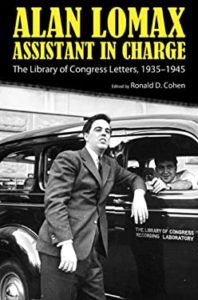
My fascination with Alan Lomax led me to edit the 2011 Alan Lomax, Assistant in Charge: The Library of Congress Letters, 1935-1945. The letters were mostly from the Library of Congress and a few other manuscript collections.
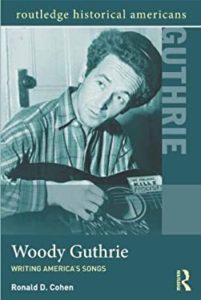
Richard Carlin next roped me into compiling another book for students, Woody Guthrie: Writing America’s Songs published in 2012. I had participated in the Guthrie Conference in Cleveland in 1996, and became involved with the Woody Guthrie Center in Tulsa, Oklahoma after it opened in 2013. I have participated in their yearly conferences while donating much of my music collection.
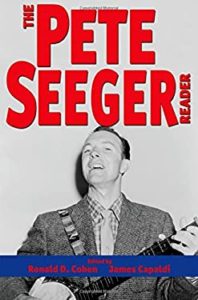
I collaborated with Jim Capaldi, who had launched a Pete Seeger website, to edit The Pete Seeger Reader. I received a post card from Pete in late 2014 after receiving his copy. He congratulated me, but noted since he was memorizing a Shakespeare sonnet he was unable to finish reading.
I had the idea to organize a session at the 2010 International Country Music Conference in Nashville on why country music should be considered only of southern origin. The session became a special issue of the Journal of American Folklore in 2014, with my essay leading off the seven contributions. While not generally a country music historian, I do include folk music within the broader country music genre.
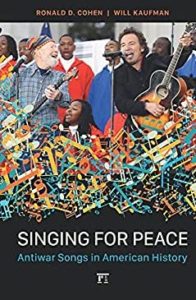
Perhaps my next book could fit as a country music title, although probably not. I began on my own with Singing For Peace: Antiwar Songs in American History. I also linked up with Stephen Petrus to help organize an exhibit at the Museum of the City of New York on that city’s rich folk music past. The exhibit was a great success, as was our 2015 accompanying book Folk City: New York and the American Folk Music Revival.
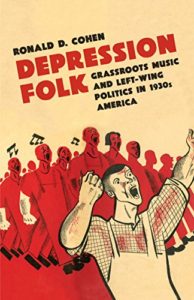
I next published Depression Folk: Grassroots Music and Left-Wing Politics in 1930s America with the University of North Carolina Press in 2016. I have donated a large collection of my materials to the university’s Southern Folklife Collection.
I also donated much of my folk music collection to the Woody Guthrie Center in Tulsa, Oklahoma. I scanned many of the items, including posters, magazine covers, and flyers. Since I enjoyed picture books, I began to work with David Bonneron on an illustrated folk music volume. I sent David the scans, and he designed the layout. Selling Folk Music: An Illustrated History, 1900-1970 came out in 2018. This was the end of my publishing string.
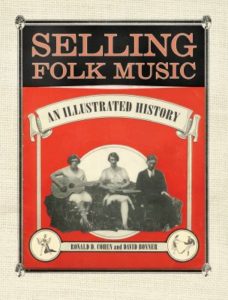
My publishing career is over. I keep busy with other obligations. I’m a member of various editorial boards such as the University of Oklahoma Press’s American Popular Music Series. I am also on the editorial board of the journal Rock Music Studies. I am on call to give advice to others, and write an occasional book review.
